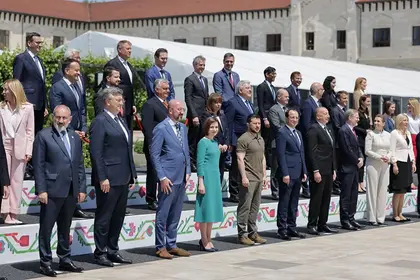President Zelensky arrived on Thursday, June 1, for the second meeting of the new European Political Community. The one-day gathering of almost 50 European leaders, was held at a castle in Bulboaca, Moldova only 13 miles from Ukraine’s western border. The proximity to the war zone was exemplified by the fact that, overhead, NATO-assigned aircraft from the US, UK and France provided air borne security.
- Get the newest Ukraine news reports as of today.
- Check the most up-to-date Ukraine news reports from today.
Ukraine was high on the agenda, both at the formal meeting and those held on the side-lines that President Zelensky held with European leaders to press Ukraine’s justification for continued support, both in the present and future.
JOIN US ON TELEGRAM
Follow our coverage of the war on the @Kyivpost_official.
While in the eyes of some analysts the EPC has little real value, the diplomatic investment to get the gathering of up to 50 leaders, including those of non-EU and non-NATO European nations to a castle 13 miles away from an active war zone suggests that European leaders do consider it to be significant.
Kaja Kallas, the prime minister of Estonia, said the meeting was “a signal that multilateralism actually works, and also that we are behind Moldova and we are behind Ukraine.
She added: “As soon as Putin realizes and Russia realizes they made a mistake with the war in Ukraine, the war will be over.”
Right from the start, standing alongside Maia Sandu, the Moldovan president and host, Zelensky called for further security guarantees to protect Ukraine and Moldova, from continuing Russian aggression until Kyiv could finally join NATO.

Zelensky Condemns Russian ‘Inhumane’ Christmas Attack on Energy Grid
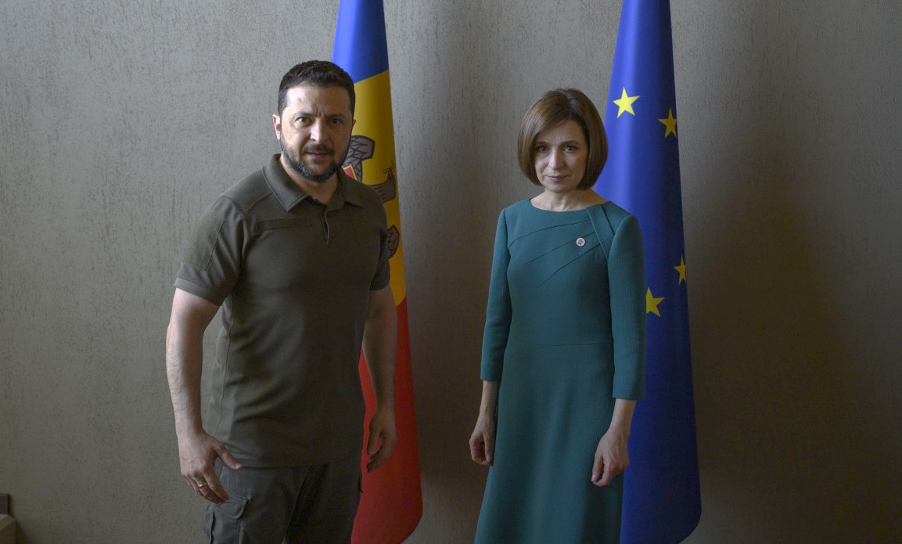
Presidents Sandu and Zelensky
Photo: president.gov.ua
“Ukraine is ready to be in NATO. We’re waiting [for the day] when NATO will be ready to have Ukraine,” he said. “I think security guarantees are very important not only for Ukraine, [but also] for our neighbors Moldova, because of Russia, their aggression in Ukraine and potentially in other parts of Europe.”
He added that while full membership of the alliance was the “best” option for Ukraine he was hoping for “a clear signal that security guarantees remain until Ukraine joins NATO.”
During a group discussion with leaders from the UK, the Netherlands, Denmark, Belgium, Poland and Sweden there was a consensus that, now the US had agreed, efforts were underway to ensure that Ukraine could receive delivery of F-16 fighters before the end of the year, possibly provided initially by the Netherlands and Denmark.
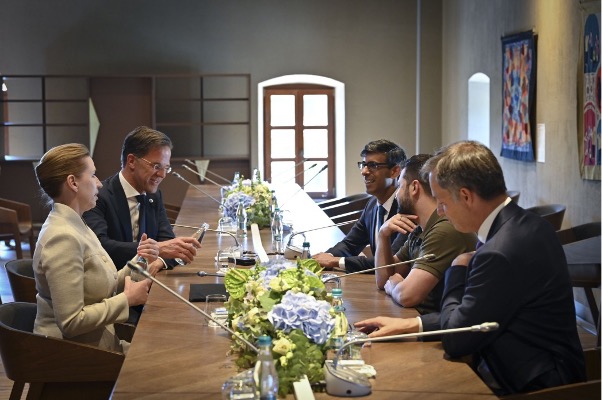
Meeting of the F-16 “Fighter Coalition”
Photo: president.gov.ua
Asked to comment on the discussions, Mateusz Morawiecki, the Polish prime minister said “It went very well. We all agreed all the next steps.” He added that there would be training not only for pilots but also in the wider areas of “logistics, maintenance and introducing [the fighters] into the Ukrainian aircraft [maintenance and logistics] system.”
Asked for his comments, Zelensky agreed it had been encouraging but said he continued to ask allies to provide Patriot missiles to fill the gap before the F-16s arrived. This would be part of a future “sky shield” protecting the whole of the European continent.
“Why Patriots?” he asked. “Because Patriots have shown the world, they can take down any type of Russian missile.”
The U.K. Prime Minister, Rishi Sunak said that Ukraine’s “rightful place is in NATO”, adding: “We want to make sure we put in place security arrangements for Ukraine for the long term so we send a very strong signal to Vladimir Putin that we are not going anywhere, we are here to stay and we will continue backing Ukraine.”
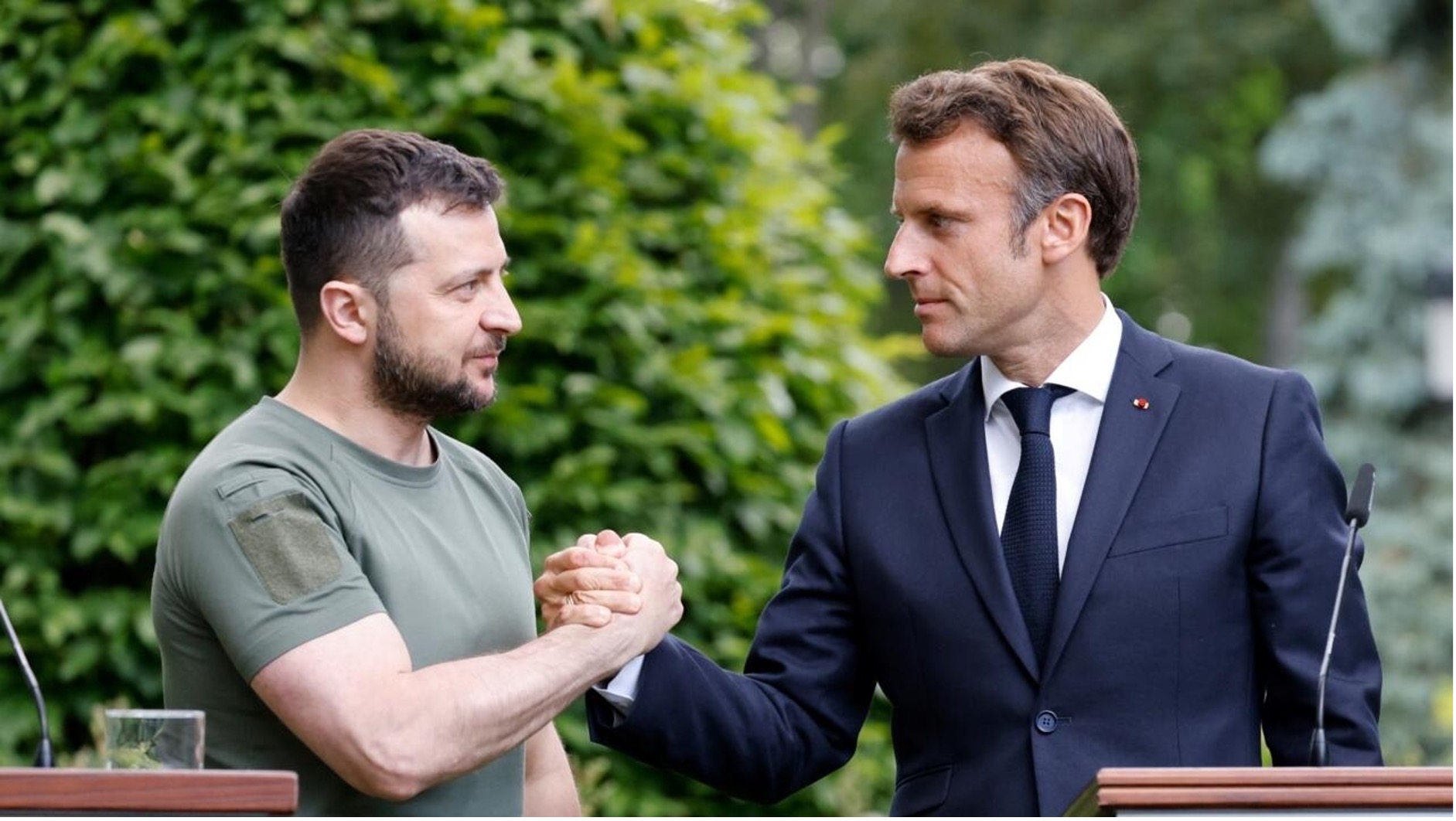
President’s Zelensky and Macron in Moldova
Photo: AFP
Following a separate meeting with President Macron of France a joint statement was issued which confirmed France's support for Ukraine's air defense capabilities as agreed during a bilateral meeting in Paris on May 14. It was previously confirmed that France had supplied a number of the Italian-French SAMP/T anti-missile defense systems and associated technical training to Kyiv in mid-May.
Zelensky also met with the President of the European Commission, Ursula von der Leyen, where they discussed a number of issues relating to Zelensky’s proposed peace formula, Ukraine’s progress towards fulfilling EU membership criteria, and European Commission support for health and child care initiatives.
They also published a joint statement, marking June 1 as International Children’s Day, in which they condemned the illegal deportation and transfer of Ukrainian children by Russia, pledging to facilitate their safe return.
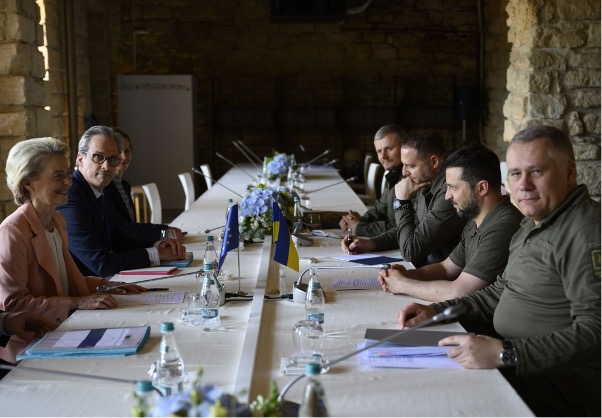
Meeting between Ukraine and the European Commission
Photo: president.gov.ua
President Zelenskyy also met with Olaf Scholz, during which he briefed the German Chancellor on the escalation of Russian missile attacks and emphasized the need to strengthen the capabilities of Ukrainian air defense. Chancellor Scholz has voiced German support for the Ukrainian Peace Formula and the implementation of a Global Peace Summit.
The leaders agreed on a need to further strengthen sanctions against the Russian economy, by way of a new EU sanctions package.
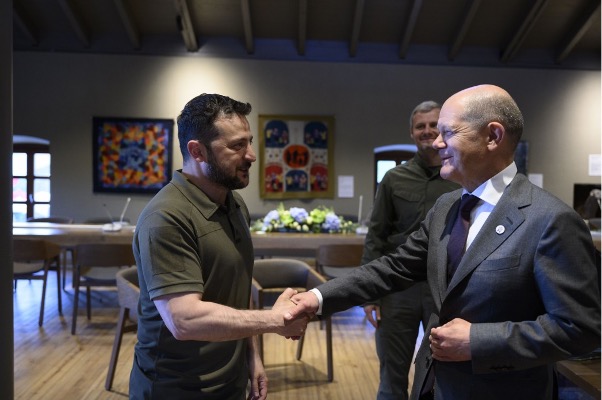
President Zelensky meets with Chancellor Scholz
Photo: president.gov.ua
Other meetings were held with the with the President of Azerbaijan, Ilham Aliyev, and the President of North Macedonia, Stevo Pendarovski whom he thanked for the humanitarian support they have provided as well as political support in the UN.
He also met with the Prime Minister of Portugal, António Costa who has provided military, political and humanitarian support for Ukraine and, in particular a readiness to support the training of Ukrainian pilots. Other issues discussed included Ukraine's path to NATO membership, the path to European integration and support for Ukraine’s proposals for a Global Peace Summit.
Having spent the first months in Kyiv after Russia’s full-scale invasion, Zelensky has traveled extensively in Europe in recent weeks meeting as many European leaders as possible and attended the summit of the Group of 7 leaders in Japan last month.
He has repeatedly pressed his case for greater military and diplomatic support for his country to ensure that which has been provided so far does not flag.
You can also highlight the text and press Ctrl + Enter


